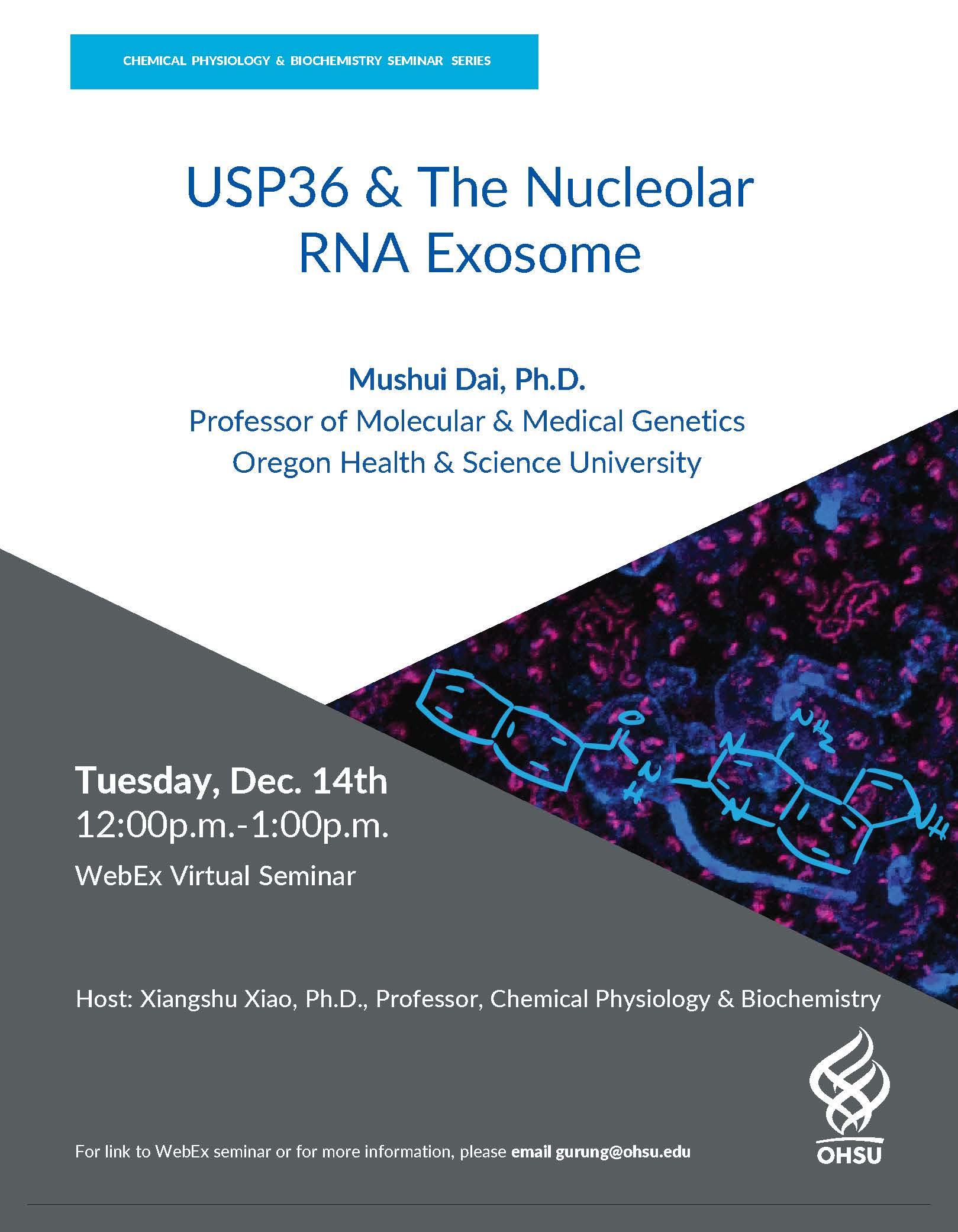USP36 & The Nucleolar RNA Exosome
Dr. Mushui Dai, OHSU
| When |
December 14, 2021
12 p.m. to 1 p.m.
AbstractDeregulated hyperactivation of ribosome biogenesis plays a critical role in cancer initiation and progression and is emerged as a therapeutic target. Therefore, it is crucial to understand how this process is regulated during normal cell homeostasis and how it is deregulated in cancer. The nucleolar RNA exosome, consisting of a 9-subunit core and a distributive 3ʹ to 5ʹ exonuclease EXOSC10, plays a crucial role in processing and degrading nucleolar RNAs, including pre-ribosomal RNA (rRNA) and snoRNAs, and thus being essential for ribosome biogenesis. However, how the RNA exosome is regulated in the nucleolus is poorly understood. We found that the nucleolar ubiquitin-specific protease USP36 is a novel regulator of the RNA exosome. USP36 binds to the RNA exosome through direct interaction with EXOSC10. Interestingly, USP36 does not significantly regulate the levels of EXOSC10 and other exosome subunits. Instead, it mediates EXOSC10 SUMOylation at Lys (K) 583. Knockdown of either USP36 or EXOSC10 impairs rRNA processing and inhibited cell growth. Mutating K583 impaired the binding of EXOSC10 to pre-rRNAs and the K583R mutant failed to rescue the defects in rRNA processing and cell growth inhibition caused by knockdown of endogenous EXOSC10. These results suggest that USP36 regulates the nucleolar RNA exosome function by acting as a SUMO ligase to mediate EXOSC10 SUMOylation and thus being critical for pre-rRNA processing and cell growth. As USP36 is overexpressed in various human cancers, it could be emerged as an important cancer therapeutic target. 
Lisa Gurung
|
|---|---|
| Where |
WebEx |
| Contact Information |
Lisa Gurung
|
Abstract
Deregulated hyperactivation of ribosome biogenesis plays a critical role in cancer initiation and progression and is emerged as a therapeutic target. Therefore, it is crucial to understand how this process is regulated during normal cell homeostasis and how it is deregulated in cancer. The nucleolar RNA exosome, consisting of a 9-subunit core and a distributive 3ʹ to 5ʹ exonuclease EXOSC10, plays a crucial role in processing and degrading nucleolar RNAs, including pre-ribosomal RNA (rRNA) and snoRNAs, and thus being essential for ribosome biogenesis. However, how the RNA exosome is regulated in the nucleolus is poorly understood. We found that the nucleolar ubiquitin-specific protease USP36 is a novel regulator of the RNA exosome. USP36 binds to the RNA exosome through direct interaction with EXOSC10. Interestingly, USP36 does not significantly regulate the levels of EXOSC10 and other exosome subunits. Instead, it mediates EXOSC10 SUMOylation at Lys (K) 583. Knockdown of either USP36 or EXOSC10 impairs rRNA processing and inhibited cell growth. Mutating K583 impaired the binding of EXOSC10 to pre-rRNAs and the K583R mutant failed to rescue the defects in rRNA processing and cell growth inhibition caused by knockdown of endogenous EXOSC10. These results suggest that USP36 regulates the nucleolar RNA exosome function by acting as a SUMO ligase to mediate EXOSC10 SUMOylation and thus being critical for pre-rRNA processing and cell growth. As USP36 is overexpressed in various human cancers, it could be emerged as an important cancer therapeutic target.
